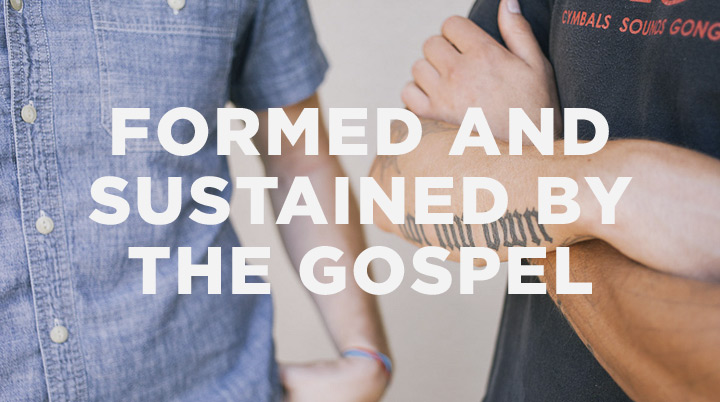Latest
-
Objections to the Christian Faith from the Unchurched and De-Churched
 Tue Dec 02, 2014
Tue Dec 02, 2014
by Resurgence -
Craig Groeschel: We Innovate for Jesus
 Tue Oct 14, 2014
Tue Oct 14, 2014
by Resurgence -
Mark Driscoll: Revelation
 Tue Oct 07, 2014
Tue Oct 07, 2014
by Resurgence -
RESURGENCE LEADERSHIP #034: JOHN PIPER, WHY I TRUST THE SCRIPTURES, PART 2
 Tue Sep 30, 2014
Tue Sep 30, 2014
by Resurgence -
Resurgence Leadership #033: John Piper, Why I Trust the Scriptures, Part 1
 Tue Sep 23, 2014
Tue Sep 23, 2014
by Resurgence

Archives
Community is formed and sustained by the gospel

Dietrich Bonhoeffer warns us this:
Those who dream of [an] idealized community demand that it be fulfilled by God, by others, and by themselves. They enter the community of Christians with their demands, set up their own law, and judge one another and even God accordingly . . . [We] can never live by our own words and deeds, but only by that one Word and deed that really binds us together, the forgiveness of sins in Jesus Christ. . . . Christian community is not an ideal we have to realize, but rather a reality created by God in Christ in which we may participate. The more clearly we learn to recognize that the ground and strength and promise of all our community is in Jesus Christ alone, the more calmly we will learn to think about our community and pray and hope for it.
Christians have been born again into a new inheritance that makes us strangers and aliens within the wider culture (1 Pet. 1:1–4). We are called to live on the margins. But that act of rebirth also births us into a new family (vv. 22–23), an alternative community of belonging. This new family is God’s demonstration of the gospel. It is the beginning of, and pointer to, the new world that will be our inheritance.
It is only the Word of God that creates an enduring community life and love.
So the gospel community matters. But this does not mean the gospel Word is less important. Quite the opposite. In 1 Peter 1:22–23, where Peter explicitly links our new birth and our new family, his emphasis is on the means by which we are born anew—the enduring Word: “For you have been born again, not of perishable seed, but of imperishable, through the living and enduring word of God” (v. 23 NIV). The Word gives life, and the Word continues to give life.
Do not try to “do” community
What forms and sustains Christian community is, perhaps paradoxically, not a commitment to community per se but a commitment to the gospel Word. Sometimes people place a big emphasis on the importance of community and neglect the gospel Word. Community then becomes a goal toward which we work. But Peter says human activity cannot create life that endures. An exclusive focus on community will kill community. It is only the Word of God that creates an enduring community life and love.
Peter calls on us to “love one another earnestly from a pure heart” (v. 22). That is a demanding command designed to create a distinctive community, but Peter first says his readers have “purified [their] souls by [their] obedience to the truth for a sincere brotherly love.” We have been purified by the gospel for love, so love. The truth purges us of those selfish desires that conflict with love, and it is this that then enables us to love one another earnestly. Love one another deeply, says Peter, “for you have been born again.”
It’s said that love is an action, not a feeling, but this is not a biblical idea.
This is who we are. We are members of a new family, bound together in brotherly love through the gospel of Jesus and the power of the Spirit. Once again, the move is from identity to action. This command is realizable because of who we are in Christ, because of the new reality that God has produced in our lives through the gospel Word. We get rid of “all malice and all deceit, hypocrisy, envy, and slander of every kind” (1 Pet. 2:1) not through gritted teeth or extra effort. We live a life of love as we crave the spiritual milk of God’s enduring Word (v. 2).
We keep going back to the gospel, keep believing the gospel, keep nurturing our hearts with the gospel, and keep tasting the goodness of God in the gospel.
This post is adapted from the upcoming Re:Lit book, Everyday Church: Gospel Communities on Mission, by Tim Chester and Steve Timmis
